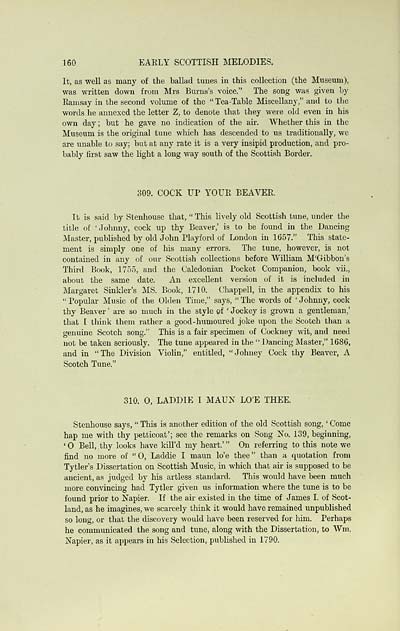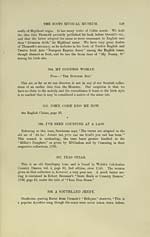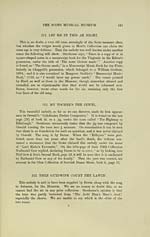Glen Collection of printed music > Printed text > Early Scottish melodies
(182) Page 160 - Cock up your beaver
Download files
Complete book:
Individual page:
Thumbnail gallery: Grid view | List view

160 EAKLY SCOTTISH MELODIES.
It, as well as many of the ballad tunes in this collection (the Museum),
was written down from Mrs Burns's voice." The song was given by
Kamsay in the second volume of the " Tea-Table Miscellany," and to the
words he annexed the letter Z, to denote that they were old even in his
own day ; but he gave no indication of the air. AVhether this in the
Museum is the original tune which has descended to us traditionally, we
are unable to say; but at any rate it is a very insipid production, and pro-
bably first saw the light a long way south of the Scottish Border.
309. COCK UP YOUE BEAVER
It is said by Stenhouse that, " This lively old Scottish tune, under the
title of 'Johnny, cock up thy Beaver,' is to be found in the Dancing
Master, published by old John Playford of London in 1657." This state-
ment is simply one of his many errors. The tune, however, is not
contained in any of our Scottish collections before William M'Gibbon's
Third Book, 1755, and the Caledonian Pocket Companion, book vii.,
about the same date. An excellent version of it is included in
Margaret Sinkler's MS. Book, 1710. Chappell, in the appendLx to his
" Popular Music of the Olden Time," says, " The words of ' Johnny, cock
thy Beaver ' are so much in the style of ' Jockey is grown a gentleman,'
that I think them rather a good-humoured joke upon the Scotch than a
genuine Scotch song." This is a fair specimen of Cockney wit, and need
not be taken seriously. The tune appeared in the " Dancing Master," 1686,
and in "The Division Violin," entitled, "Johney Cock thy Beaver, A
Scotch Tune."
310. 0, LADDIE I MAUN LO'E THEE.
Stenhouse says, " This is another edition of the old Scottish song, ' Come
hap me with thy petticoat'; see the remarks on Song No. 139, beginning,
'0 Bell, thy looks have kill'd my heart.'" On referring to this note we
find no more of "0, Laddie I maun lo'e thee" than a quotation from
Tytler's Dissertation on Scottish Music, in which that air is supposed to be
ancient, as judged by his artless standard. This would have been much
more convincing had Tytler given us information where the tune is to be
found prior to Napier. If the air existed in the time of James I. of Scot-
land, as he imagines, we scarcely think it would have remained unpublished
so long, or that the discovery would have been reserved for him. Perhaps
he communicated the song and tune, along with the Dissertation, to Wm.
Napier, as it appears in his Selection, published in 1790.
It, as well as many of the ballad tunes in this collection (the Museum),
was written down from Mrs Burns's voice." The song was given by
Kamsay in the second volume of the " Tea-Table Miscellany," and to the
words he annexed the letter Z, to denote that they were old even in his
own day ; but he gave no indication of the air. AVhether this in the
Museum is the original tune which has descended to us traditionally, we
are unable to say; but at any rate it is a very insipid production, and pro-
bably first saw the light a long way south of the Scottish Border.
309. COCK UP YOUE BEAVER
It is said by Stenhouse that, " This lively old Scottish tune, under the
title of 'Johnny, cock up thy Beaver,' is to be found in the Dancing
Master, published by old John Playford of London in 1657." This state-
ment is simply one of his many errors. The tune, however, is not
contained in any of our Scottish collections before William M'Gibbon's
Third Book, 1755, and the Caledonian Pocket Companion, book vii.,
about the same date. An excellent version of it is included in
Margaret Sinkler's MS. Book, 1710. Chappell, in the appendLx to his
" Popular Music of the Olden Time," says, " The words of ' Johnny, cock
thy Beaver ' are so much in the style of ' Jockey is grown a gentleman,'
that I think them rather a good-humoured joke upon the Scotch than a
genuine Scotch song." This is a fair specimen of Cockney wit, and need
not be taken seriously. The tune appeared in the " Dancing Master," 1686,
and in "The Division Violin," entitled, "Johney Cock thy Beaver, A
Scotch Tune."
310. 0, LADDIE I MAUN LO'E THEE.
Stenhouse says, " This is another edition of the old Scottish song, ' Come
hap me with thy petticoat'; see the remarks on Song No. 139, beginning,
'0 Bell, thy looks have kill'd my heart.'" On referring to this note we
find no more of "0, Laddie I maun lo'e thee" than a quotation from
Tytler's Dissertation on Scottish Music, in which that air is supposed to be
ancient, as judged by his artless standard. This would have been much
more convincing had Tytler given us information where the tune is to be
found prior to Napier. If the air existed in the time of James I. of Scot-
land, as he imagines, we scarcely think it would have remained unpublished
so long, or that the discovery would have been reserved for him. Perhaps
he communicated the song and tune, along with the Dissertation, to Wm.
Napier, as it appears in his Selection, published in 1790.
Set display mode to: Large image | Transcription
Images and transcriptions on this page, including medium image downloads, may be used under the Creative Commons Attribution 4.0 International Licence unless otherwise stated. ![]()
| Special collections of printed music > Glen Collection of printed music > Printed text > Early Scottish melodies > (182) Page 160 - Cock up your beaver |
|---|
| Permanent URL | https://digital.nls.uk/91349758 |
|---|---|
| Description | Also: O, laddie I maun lo'e thee |
| Description | Scottish songs and music of the 18th and early 19th centuries, including music for the Highland bagpipe. These are selected items from the collection of John Glen (1833 to 1904). Also includes a few manuscripts, some treatises, and other books on the subject. |
|---|
| Description | The Glen Collection and the Inglis Collection represent mainly 18th and 19th century Scottish music, including Scottish songs. The collections of Berlioz and Verdi collected by bibliographer Cecil Hopkinson contain contemporary and later editions of the works of the two composers Berlioz and Verdi. |
|---|

